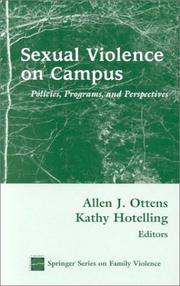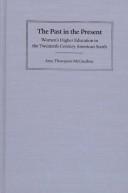| Listing 1 - 10 of 32 | << page >> |
Sort by
|
Book
ISBN: 0674073541 0674073517 9780674073517 9780674049574 0674049578 Year: 2013 Publisher: Cambridge, MA
Abstract | Keywords | Export | Availability | Bookmark
 Loading...
Loading...Choose an application
- Reference Manager
- EndNote
- RefWorks (Direct export to RefWorks)
Two young women, dormitory mates, embark on their education at a big state university. Five years later, one is earning a good salary at a prestigious accounting firm. With no loans to repay, she lives in a fashionable apartment with her fiancé. The other woman, saddled with burdensome debt and a low GPA, is still struggling to finish her degree in tourism. In an era of skyrocketing tuition and mounting concern over whether college is "worth it," Paying for the Party is an indispensable contribution to the dialogue assessing the state of American higher education. A powerful exposé of unmet obligations and misplaced priorities, it explains in vivid detail why so many leave college with so little to show for it. Drawing on findings from a five-year interview study, Elizabeth Armstrong and Laura Hamilton bring us to the campus of "MU," a flagship Midwestern public university, where we follow a group of women drawn into a culture of status seeking and sororities. Mapping different pathways available to MU students, the authors demonstrate that the most well-resourced and seductive route is a "party pathway" anchored in the Greek system and facilitated by the administration. This pathway exerts influence over the academic and social experiences of all students, and while it benefits the affluent and well-connected, Armstrong and Hamilton make clear how it seriously disadvantages the majority. Eye-opening and provocative, Paying for the Party reveals how outcomes can differ so dramatically for those whom universities enroll.
Educational sociology --- Public universities and colleges --- Women college students --- Co-eds --- College students --- Women --- Women in higher education --- Universities and colleges --- Social conditions. --- Education
Book
ISBN: 1281958506 9786611958503 0803219423 9780803219427 0803239653 9780803239654 Year: 2008 Publisher: Lincoln University of Nebraska Press
Abstract | Keywords | Export | Availability | Bookmark
 Loading...
Loading...Choose an application
- Reference Manager
- EndNote
- RefWorks (Direct export to RefWorks)
With the passage of the Morrill Act in 1862, many states in the Midwest and the West chartered land-grant colleges following the Civil War. Because of both progressive ideologies and economic necessity, these institutions admitted women from their inception and were among the first public institutions to practice coeducation. Although female students did not feel completely accepted by their male peers and professors in the land-grant environment, many of them nonetheless successfully negotiated greater gender inclusion for themselves and their peers.
Sexism in higher education --- Coeducation --- Women --- Women college students --- Human females --- Wimmin --- Woman --- Womon --- Womyn --- Females --- Human beings --- Femininity --- Co-eds --- College students --- Women in higher education --- Education, Higher --- Education --- Single-sex classes (Education) --- Single-sex schools
Book
ISBN: 1579225195 9781579225193 9781579223502 1579223508 100344444X 1000972232 1000977498 Year: 2011 Publisher: Sterling, Va. Stylus Pub.
Abstract | Keywords | Export | Availability | Bookmark
 Loading...
Loading...Choose an application
- Reference Manager
- EndNote
- RefWorks (Direct export to RefWorks)
How do we interrupt the current paradigms of sexism in the academy? How do we construct a new and inclusive gender paradigm that resists the dominant values of the patriarchy? And why are these agendas important not just for women, but for higher education as a whole? These are the questions that these extensive and rich analyses of the historical and contemporary roles of women in higher education- as administrators, faculty, students, and student affairs professionals- seek constructively to answer. In doing so they address the intersection of gender and women's other social identities, such
Women in higher education. --- Women college teachers. --- Women college students. --- Feminism and higher education. --- Higher education and feminism --- Education, Higher --- Co-eds --- College students --- Women --- Women in higher education --- Women as college teachers --- College teachers --- Women teachers --- Education
Book
ISBN: 1421419068 9781421419060 9781421419053 142141905X Year: 2019 Publisher: Baltimore: Johns Hopkins University Press,
Abstract | Keywords | Export | Availability | Bookmark
 Loading...
Loading...Choose an application
- Reference Manager
- EndNote
- RefWorks (Direct export to RefWorks)
Rape victims --- Women college students --- Rape in universities and colleges --- Female rape victims --- Sexual abuse victims --- Co-eds --- College students --- Women --- Women in higher education --- Campus rape --- College rape --- Campus violence --- Universities and colleges --- Psychology. --- Rehabilitation --- Crimes against --- Education
Book
ISBN: 9783877077405 Year: 2008 Publisher: Gießen : Justus-Liebig-Universität Giessen,
Abstract | Keywords | Export | Availability | Bookmark
 Loading...
Loading...Choose an application
- Reference Manager
- EndNote
- RefWorks (Direct export to RefWorks)
Women --- Femmes --- Education (Higher) --- Enseignement supérieur --- Justus Liebig-Universität Giessen --- Students --- History --- Enseignement supérieur --- Justus Liebig-Universität Giessen --- Women college students --- Women in higher education --- Human females --- Wimmin --- Woman --- Womon --- Womyn --- Females --- Human beings --- Femininity --- Education, Higher --- Co-eds --- College students --- Education (Higher)&delete& --- Education --- Faculty. --- Students.
Book
ISBN: 1138911496 0367233762 1315692627 1317433688 Year: 2017 Publisher: London ; New York : Routledge,
Abstract | Keywords | Export | Availability | Bookmark
 Loading...
Loading...Choose an application
- Reference Manager
- EndNote
- RefWorks (Direct export to RefWorks)
Feminist scholarship is sometimes dismissed as not quite 'proper' knowledge - it's too political or subjective, many argue. But what are the boundaries of 'proper' knowledge? Who defines them, and how are they changing? How do feminists negotiate them? And how does this boundary-work affect women's and gender studies, and its scholars' and students' lives? These are the questions tackled by this ground-breaking ethnography of academia inspired by feminist epistemology, Foucault, and science and technology studies. Drawing on data collected over a decade in Portugal and the UK, US and Scandinavia, this title explores different spaces of academic work and sociability, considering both official discourse and 'corridor talk'. It links epistemic negotiations to the shifting political economy of academic labour, and situates the smallest (but fiercest) departmental negotiations within global relations of unequal academic exchange. Through these links, this timely volume also raises urgent questions about the current state and status of gender studies and the mood of contemporary academia.
Women's studies. --- Women college teachers. --- Women college students. --- Feminism and education. --- Education and feminism --- Education --- Co-eds --- College students --- Women --- Women in higher education --- Women as college teachers --- College teachers --- Women teachers --- Female studies --- Feminist studies --- Women studies --- Study and teaching --- Curricula --- Sociology --- Epistemology --- Ethnography --- Academia --- Feminism --- Higher education --- Knowledge --- Power --- Universities --- Social theory --- Academic labour --- Gender studies --- Performativity
Book
ISBN: 9065507396 Year: 2003 Publisher: Hilversum Verloren
Abstract | Keywords | Export | Availability | Bookmark
 Loading...
Loading...Choose an application
- Reference Manager
- EndNote
- RefWorks (Direct export to RefWorks)
Vrouwelijke studenten en wetenschappers zijn geen zeldzaamheid meer aan de Wageningse Universiteit. Vanaf 1918 nam het aandeel vrouwelijke studenten van enkelen per jaar toe naar ruim de helft. In deze publicatie is er niet alleen aandacht voor hun studiekeuze en studierendement, maar ook voor het studieklimaat, het studentenleven en de maatschappelijke positie van de afgestudeerde vrouwen. Diegenen die een universitaire loopbaan nastreefden, moesten tot 1946 genoegen nemen met een positie als assistent. Sindsdien zijn enkelen in de wetenschappelijke top doorgedrongen. Deze Wageningse vrouwen worden hier voor het voetlicht gehaald.
Women college students --- 378.4 <492 WAGENINGEN> --- 378.4 <492 WAGENINGEN> Universiteiten--Nederland--WAGENINGEN --- Universiteiten--Nederland--WAGENINGEN --- Co-eds --- College students --- Women --- Women in higher education --- History --- Education --- Wageningen Universiteit --- Wageningen University --- Universiteit Wageningen --- Universidad de Wageningen --- Landbouwuniversiteit Wageningen --- Sociology of occupations --- Technical, artistic and vocational education --- Higher education --- Personnel management --- anno 1900-1999 --- Netherlands --- Career --- Students --- Academic sector --- Vocational education --- Book --- Experiences

ISBN: 1281765813 9786611765811 0826197132 9780826197139 0826113745 9780826113740 9781281765819 6611765816 Year: 2001 Publisher: New York Springer
Abstract | Keywords | Export | Availability | Bookmark
 Loading...
Loading...Choose an application
- Reference Manager
- EndNote
- RefWorks (Direct export to RefWorks)
This is a somber reminder that sexual aggression, violence, and rape are chronic and serious problems on college campuses today. The volume proposes proactive strides toward stopping such violence. It addresses the role of alcohol and rape, includes the latest information on club drugs and drug-facilitated rape, and explores the special issues surrounding gay, lesbian and transgender violence. Chapters also address changing ""the culture"" found in, and often fostered by, fraternities an
Sexual harassment in universities and colleges --- Sexual harassment --- Women college students --- Male college students --- Men college students --- College students --- Co-eds --- Women --- Women in higher education --- Sexual harassment in the workplace --- Workplace sexual harassment --- Harassment --- Sex role in the work environment --- Prevention. --- Crimes against --- Psychology. --- Education

ISBN: 0585263698 9780585263694 0817309454 0817309942 9780817309459 9780817309947 Year: 1999 Publisher: [Place of publication not identified] University of Alabama Press
Abstract | Keywords | Export | Availability | Bookmark
 Loading...
Loading...Choose an application
- Reference Manager
- EndNote
- RefWorks (Direct export to RefWorks)
Women --- Women college students --- Universities and colleges --- Education, Special Topics --- Education --- Social Sciences --- Colleges --- Degree-granting institutions --- Higher education institutions --- Higher education providers --- Institutions of higher education --- Postsecondary institutions --- Public institutions --- Schools --- Education, Higher --- Co-eds --- College students --- Women in higher education --- Human females --- Wimmin --- Woman --- Womon --- Womyn --- Females --- Human beings --- Femininity --- History --- Education (Higher) --- Conduct of life --- Sociological aspects
Book
ISBN: 1283735199 0813553199 9780813553191 9780813551401 0813551404 Year: 2012 Publisher: New Brunswick, N.J. Rutgers University Press
Abstract | Keywords | Export | Availability | Bookmark
 Loading...
Loading...Choose an application
- Reference Manager
- EndNote
- RefWorks (Direct export to RefWorks)
In the popular imagination, American women during the time between the end of World War II and the 1960's—the era of the so-called “feminine mystique”—were ultraconservative and passive. College Women in the Nuclear Age takes a fresh look at these women, showing them actively searching for their place in the world while engaging with the larger intellectual and political movements of the times. Drawing from the letters and diaries of young women in the Cold War era, Babette Faehmel seeks to restore their unique voices and to chronicle their collective ambitions. She also explores the shifting roles that higher education played in establishing these hopes and dreams, making the case that the GI Bill served to diminish the ambitions of many American women even as it opened opportunities for many American men. A treasure-trove of original research, the book should stimulate scholarly discussion and captivate any reader interested in the thoughts and lives of American women.
Feminism --- Sex differences in education --- Women college students --- Women --- Education --- Co-eds --- College students --- Women in higher education --- Human females --- Wimmin --- Woman --- Womon --- Womyn --- Females --- Human beings --- Femininity --- History --- Education (Higher) --- 378.4-055.2 --- 378.4 <73> --- 378.4 <73> Universiteiten--Verenigde Staten van Amerika. VSA. USA --- Universiteiten--Verenigde Staten van Amerika. VSA. USA --- Universiteiten--Vrouwen --- Sex differences
| Listing 1 - 10 of 32 | << page >> |
Sort by
|

 Search
Search Feedback
Feedback About UniCat
About UniCat  Help
Help News
News